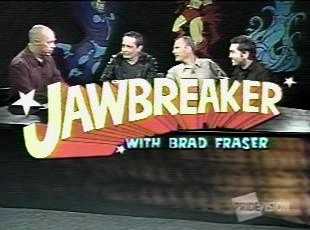
December 13, 2002
|
The topic of this week's Jawbreaker episode with Brad Fraser was Queer As Folk. As many of you know, Brad is a writer on QAF, in addition to his hosting duties on Jawbreaker and other projects. He asked Dan Lipman (executive producer/head writer), Michael Lewis MacLennan (producer/writer) and Scott Lowell (the actor who plays Ted) to talk about the series and the issues surrounding the show. Much of what they discussed has been talked about in other forums, raised in interviews, and so on; however, there were some interesting insights that were shared concerning character development and the writing process in particular, that I think even the most knowledgeable and well-read fans of the show might find interesting. I have summarized the discussion here, but given that this was a one hour show, with lots of dialogue and subtext, please feel free to email me with any questions.
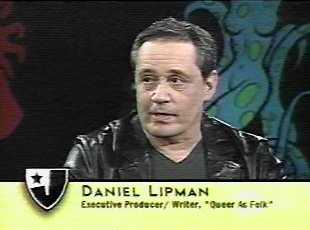
Brad asked the guests to give the audience some background on the series, so Dan talked about how the series came to be, and how he and his partner Ron Cowen made the original, UK version of QAF into a North American series. The financing had fallen through on another series that he and Ron were doing for Showtime, and since they had a good working relationship with the network, Showtime offered them QAF. They had not seen the UK version before then, but they sat down and watched the tapes and were startled, as were many others who had seen it. There was some trepidation about doing it, since many British adaptations had not worked... Fawlty Towers (the classic 1970s BBC comedy series starring John Cleese and set in the fictional Fawlty Towers hotel in Torquay on the English Riviera), and Absolutely Fabulous (A BBC comedy tv series about a "wacky" mother who acts like a "flower child" from the sixties and her politically correct daughter) just to name two. All in the Family did work, as did Three's Company (Scott Lowell jumped in here with a humorous comment, "Thank god for that!", and Brad jokingly added, "Where would we be if it hadn't?" LOL!). Dan said that he was intrigued by the graphic nature of the show, and not just the explicitness of the language and the sex, but also by the fact that it was charming, as was the man behind the series, Russell T. Davies, whom Dan describes as "witty and charming." He and Ron felt that their collective voice could express that in an adaptation–more specifically, an American version. Now that they are filming in Toronto, of course, they call it the "North American version," and while Dan said he wasn't trying to "blow smoke up the Canadians' ass" he complimented the Canadian members of the cast and crew by saying they are wonderful. They have a great time on the show. The writing team is divided equally, there are three Canadian writers. "The only thing is, you spell 'color' with a 'u'," Dan joked (along with a lot of other words!).
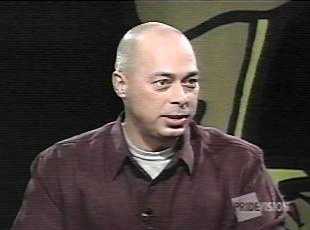
Brad asked what kind of changes had to be made to adapt the series. Dan explained that in terms of locale, they wanted to replicate this Manchester atmosphere, because if they had done the show in a big city like Chicago, San Francisco, even Toronto... they all offer a more glamorous life, and careers... so they wanted to have more of a middle-American, working-class feel... although certainly the character of Brian is not middle class. "The important thing is that we wanted to give more of a psychology to the characters. I think Americans are much more into 'psychologizing' the characters than the British are [which means North American viewers tend to want to explain behavior in psychological terms], so we needed to really find out why the Brian character was the way he was, and not being simplistic (we talked about this endlessly in the writers' room) .. not saying, 'because you have a mean father you become someone who can't love'.. it's not that at all, but how does this character evolve, what is the psychology, how did he get to where he was, and more than the British character Stuart, he turns into this much more Ayn Rand-ian individualist, and so that was a specific piece of business of change." Dan talked about the character of Ted. "Originally, the character of Ted, in the British series, died of a drug overdose in the second episode, and in this series that was how it was supposed to be, because we thought that was great -- you introduce a character and then they're gone. They've done that on Hill Street Blues, I think. We all fell in love with Scott Lowell and we couldn't possibly let him go." [Scott said he told Dan he was going to be a ghost! LOL] Brad asked if Showtime pushed them to be edgy. Dan mentioned an article in the Los Angeles Calendar [part of the "Times"] that was titled, "The Greatest Series America Will Never See" which was published before the deal was even signed. "They were saying if Showtime does it, it will never be sexual, and they're going to just wimp out, so we said ‘If we do this, we have to either match the British or go beyond,' and Showtime agreed, and they have really been supportive and left us alone, they never questioned a storyline. And you can't do a show like this and work under those kind of constraints. There is always a limit -- even though Showtime is 'NO LIMITS' -- but as the producers, our team says how far we can go." Brad asked if Ron and Dan had to work to not censor themselves? (coming from network televsion) "Yes," Dan replied. "I think anyone working in cable -- producer, actor, writer, director -- feels this way. I think that's very much a factor. You have to turn off the censors. You have to write the show with your balls. You have to act it with your balls." Brad joked, "I have to write it with my dick... try getting ink out of your dick at the end of the day!" Scott added, "It's easier with a fine point." Ba-dum-bump! "Turning the censor off became easier," Dan continued. "Sometimes writing a story they'd say, 'This sounds network-y to me.. how do we make it more 'QAF'... but as we all know, and the actors too, when we start to say, 'well I don't know...' that's when you have to do it."
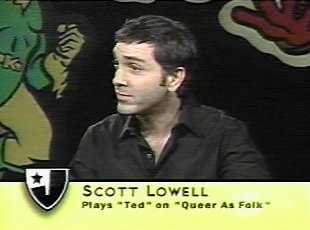
Brad asked Scott what his reaction was to being offered the part. "I was already going toward the runway to sitcom land, I'd done "Caroline in the City" and "Frasier", and that's very much where my agents were focusing their energies toward me, and that's great, I enjoy doing comedy. When the script came along for QAF, I had read an article probably about a year before, about the British series, and it was mostly focusing on the relationship between a 29-year-old man and a 17 year-old (or 16 year-old kid, actually, in the British series), so I was aware of it, and when I got the script it scared the hell out of me. I read it, and I thought what everyone else did, 'They'll never put this on TV, they can't put this on TV, what is this?' and it made me nervous, but the writing was so strong, and it was so engaging, I read the whole thing in one fell swoop, and couldn't put it down... especially this character, I mean I never thought of another character. Had I not been told which character I was auditioning for, Ted was the only guy I could relate to, very much because of my situation, the move to Los Angeles, and what you asked earlier, because Los Angeles is like one big gay club.. it's a world where youth and beauty, and added to it weath and success, are prized there. Having moved there from Chicago my first year there was spent feeling like crap; I felt like a fairly attractive guy while I was in Chicago and I moved out to Los Angeles, and the whole food chain got switched and suddenly I was the biggest geek in the world out there. The very first scene that Ted has, I had lived, of him standing at a bar, checking out somebody cute going by, trying to start a conversation with them, and they walk by like you're a ghost, you're not there. I read this, and it was my life, or a phase of my life, I should say. So I just responded very strongly to it. And I was more scared about the nudity than the gay content. At least in the pilot there wasn't much of it for Ted, and I said, 'well, he's a loser, he won't be taking his clothes off much.' Famous last words! Like Dan said, it's something that was scary, and that's when you say, 'okay why is it scaring me' and alright, let's do it." Brad asked if anyone told Scott not to take the role. "I had one friend who said to me, after we had signed the contract for like five or six years, that it was 'an awful long time to play gay.' But my agents, my manager and my family were behind me, my sister is gay, so it was in a way something important. I didn't quite know how important the show was going to be." Brad then asked if Scott had any idea of the impact it would have? "No, because until I got to work on the show and really enmesh myself in it, I don't think I understood historically where the show was going to fit in. It was a great show, with fascinating three-dimensional characters. I hadn't seen the British series, I didn't want to watch it because this was like 'our thing' and I didn't want to see it. The first day I arrived I had a terrible fitting... I literally came right from the airport to the studios for a wardrobe fitting and they put me in these little leather shorts and a white tank top -- and I've never worn a tank top in my life! -- (Brad and Dan pointed out that it's not the current Costume Designer on the show, thank goodness) -- there's a polaroid floating around somewhere, if anyone finds it they can make a fortune on eBay. I just kind of made a face, and said 'this seems a little out there.' "
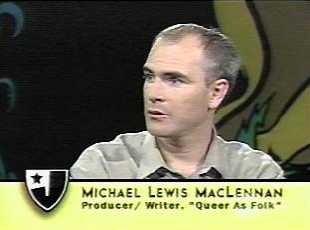
Next, Brad wanted to hear from Michael MacLennan, who is both a writer and a producer on the show, and how he became involved in Queer As Folk, especially after working on the Canadian series Wind at my Back a heartwarming family drama which was set in the fictional mining town of New Bedford, probably about as far removed from the backroom of Babylon as you can get. "I had seen the British series, I knew they were filming it in Toronto, and I had been writing a lot for TV but it was the first time I really felt I could write from my heart. I really believed in the aims of the show," he explained. Michael had been attending a workshop of a play at Niagara on the Lake at the Shaw Festival, and there was a panel for QAF taking place. He was hesitant at first to speak with the producers, but finally Michael approached Ron, who had heard of him, so he asked if he'd be willing to look at his work, and one thing led to another... as Michael explains it, his association with Ron and Dan began with a combination of them connecting to his material and connecting to him. They did not want to see his TV work, but something that was from his own voice, a feature film and a play, and they had heard good things about him. Dan pointed out that Michael wrote a film that Thom Best, the Director of Photography for QAF, directed. Brad talked a little bit about "The Room" at QAF, where the writers gather to work their magic. "There is a huge amount of work that goes on long before anybody on the set ever sees it," he said. He asked Michael to tell everyone about the process. "First of all, we have a very rough idea of the overall arc of a season, but we don't know in the 4th episode that such-and-such is happening in the 8th, so there's a very organic process to it that way. In alternating weeks, we take a week to what's called 'break' a story, which is where Ron and Dan, and the other writers..." "Yell at us!" Brad interjected. Michael laughed, then continued, "No, we remind ourselves of what we accomplished last week, what stories we told, where the characters are at, who we are "servicing" that week, and we start to evolve the storylines, and it takes about a week to figure out the structure of what's actually going to happen on one episode. We have a white board. The show is not designed to be created for commercials, so we use a classic 3-act structure, beginning, middle and end, and we sort of stare at this dry-erase marker board, which is white at the beginning of the week, on Monday, but by Friday it's filled with various colors of storylines, and there are Thursday mornings where we walk in there and look at the board and take out a story. "We've done it at 3:00 on Fridays," Brad adds.
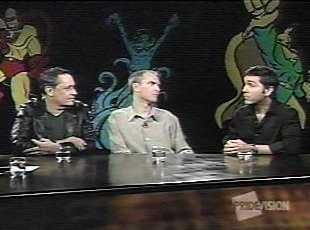
"I think that's what sets the show apart, though, is that we really listen to the characters," Michael said. "There's often times where we're trying to make a story work, valiantly trying, and somebody just says, "You know, I just don't think this character would do that..." At this point, Dan jumped in, saying this is why he's never believed in 'bibles.' "Oh no," he joked, "we're going to get letters now... 'Dan doesn't believe in bibles!' " Brad explained that a bible for a television series is the concept, the characters and the setting. Dan said that what some shows used to do (and maybe still do) was have the entire season all mapped out... but the problem with that is if you don't listen to your characters, you end up wedging them into things... saying 'you've got to fit'. Michael said that the writers are often as surprised as the audience is at what's going to happen. "You can't have a bird's eye view of the whole season that way, you have to really get in there. When Dan talks about not being ‘network,’ being more edgy, it's where we're going through the normal conclusions, that's what we'd see on NBC." He used an example of an idea in the second season where Ted was going to start stalking this guy, and they were getting really far along into the story, and then they just started to question it, and Dan said, "I just don't think Ted would do this!" Brad thought that sometimes you get into trouble saying that as well, though, because it can be an excuse for not finding a really imaginative way to take the character somewhere else. Michael agreed, but said that "There's sort of in the bone structure of a character what they'll do, but our characters change, too, for example, say Michael at the beginning of the season was very much not an equal to his best friend Brian. He didn't have a lot of success, he didn't know the world very well, and we've seen him evolve in a huge way." Brad asked how writing for QAF is different from writing for another television show? "This show, more than any show I know of, spends more time in that most important structure stage, exploring the character," Michael explained. "On most shows, the writer would 'pitch' the producers an episode, an idea, then they'd give him notes on that, he'd write a draft, and so on... but with QAF, we're all in there together... it's slower, but it's better." Brad said, "I think we should let the audience know that we don't actually write the scripts together." "Right. After Friday, it's assigned, so if it's my turn in the rotation, I'll take the script and I will then write the outline and then begin to work with Ron and Dan just through the notes on the draft process. And then, it goes to them, they work their magic on it... " "Ron and Dan Dance on it," is how Brad described it. Michael continued, "It's a very strange process, because we're all together at the beginning, then we go off on our own... the show has to have the same kind of voice. Or, for example, the day before it's raining, so they have to change a scene."
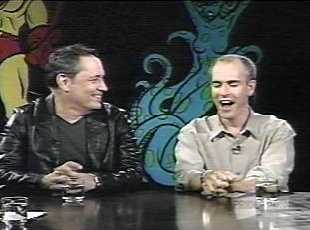
Dan continued, from a production point of view. "Until it's shot, and you get a production draft, and production gets involved, and they have to do what's called a 'board' and you have to plan out each day, there's no point going to a location if it fills an entire location day, so they'll come to us and say, ‘Can we take the scene out, can Ted and Emmett be walking down the street instead of at the condo?’ because they're [the team] not at the studio, and sometimes you have to make changes ... sometimes they’ll ask for wild things, like 'Don't you think Ted and Emmett could be walking underground'... and I'll say, 'No! No!' and they respond, 'But the board will work!' LOL Michael added that they [production] always want to shoot everything in the diner [because it's there, and it's easy]. Brad asked Scott what he finds different working on this series than on any other? (Where, presumably, he’s not engaging in graphic sex). "What's so exciting about the show and what's so very different is that there's a very collaborative ensemble orientation to it, and beyond just the cast, it's something we felt from the get-go, the first season, this is where Dan and Ron created the tone... it works its way from the head on down ("the shaft" he joked)... they set the tone of a working environment where, in some ways, we as the actors are the guardians of the characters and we try to work with them and the writers so that we're all together. On other shows it's 'here's your words, say them, and off you go.' And it goes on to the crew as well... I think what's unique on this show and all the people who work on it, it feels like a family. Every actor I've worked with on the show (day player, etc.) has come to me on the last day of the shoot, saying, 'I've got a great idea for when I come back.' They all want to come back." Does Scott's family watch? "My mom watches it, I don't think my dad watches it... he knows of it, he works in a hospital, and all the nurses--male and female--watch it, so he likes that, my brother doesn't watch it, my sister watches it... she has parties every Sunday." "Did that enter your mind in the process...what your family would think of this?" Brad asked. Scott mentioned that he is adopted, and recently found his birth parents, who are Pentecostal, and joked, "They love it, they've converted, they're both gay now."
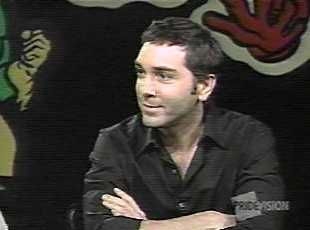
Brad mentioned that there have been a lot of reactions to the show... both positive and negative... even within the gay community. He also mentioned the large percentage of straight female viewers. Dan spoke to this point. "The show is controversial, and continues to be. Part of that is that the show is a celebration of gay life. In the beginning, we thought, ‘all of these straight, right-wing, religious groups are going to come after us’ ... he talked about how it was aimed at a niche audience, the gay community. "The irony is, no one came after us, except the gay community." Brad wondered why this was... he has his own ideas, one of them being that there is not much gay representation on television, so the little bit they do have, people take very seriously, in a way that straight people don't because they are everywhere on TV. "Political Correctness is suffocating to anything artistic, or anything true to life," Dan stated. "If Ron were here, he'd say 'if you don't like the reflection, don't look in the mirror." Dan said he actually thinks QAF is mild compared to what he knows happens in the gay community. "This show was about, is about, even though the characters are evolving, these young, late 20s early 30s, who live in this community, who live to go to Liberty avenue environment with Babylon and drugs, and sex. There are so many straight guys who do the same thing, nobody says a thing, but because they're gay, there's very much this double standard." Brad agreed. "Everyone wants them to be role models, but they don't understand we're just writing characters." Michael offered his opinion. "Because fags know that straights are watching the show, they get uptight. They don't want some of our secrets being told. A friend of mine told all his friends at work that I was writing for the show and then told them to watch. It was the episode where Brian meets Dr. Dave at the baths... the ‘what’s up doc’ scene." His friend went in to work the next day and was horribly embarrassed, and told everyone that not all gays visit the baths, or behave that way... and Michael said to his friend, "You visit the baths three times a week!" and his friend said, "Yes, but I don’t want THEM to know that!" Michael says that kind of epitomizes what he views as the negative reaction to this show. "If this could be a show where only gays watched, there would be no backlash." Brad added that they as writers have never seen that they have a job to do where they represent the entire community. Dan and Michael agreed. The show reflects the diversity of friendship that occurs in the gay community, and outside of it as well, with their family and friends. It’s never about "we must have this and do this"... the writers are just listening to the characters and if they want to do something wild and wacky, then they usually let them do it. They also listen to the world of art. Dan said, "There's a wide tapestry of gay characters, including the lesbians; they're together, and Michael and Ben are together, and now Emmett and Ted are together, but I think it all stems from the Brian and Justin characters, because you have the character of Brian who has this incredible masculine energy, sexual energy, sort of that whole center of energy of the show. If he were straight, he'd be hailed, he'd be applauded, but he's not, he's gay; you have Justin who knew in a second, when he crossed the street in the pilot, he knew what he wanted... everyone thinks that Brian is the predator, but it was Justin who went after him. And you don't have this teenager walking around with angst... you don't have ANYONE on this show walking around with angst, you know, 'I'm gay, I can't stand it, the pain, make it stop'..." Brad shared a joke that they have in the writer's room, where "if you go out to bars or whatever, you never say you write for QAF because everyone has either the best idea for a storyline, or they know how to fix it, both of which are really annoying when you just want to have a drink." He then asked Scott, "How do people react to you when they see you, what do they say?" "A lot of people say, ‘You're on that show, aren't you?’ It's funny the number of times people WON'T say the title of the show... they're trying to say that they know me or something, and it's like some kind of secret handshake or something. Which is quite delightful. It's fine... some people say 'I've heard of it, but I don't have cable.' I tell them they can rent it on DVD. I'm surprised more and more as time goes on the number of straight guys who are starting to watch the show, and say, yeah, it's a little weird, but..." Do straight women hit on you because of your part on the show? "Yeah, more so because they want to give me psychological help, get me off the drugs, boost my self-esteem," Scott laughs. "The one I get on a consistent basis is ‘you're much better looking in person,’ or ‘you're not so bad looking,’ which is great." Getting back to what was being discussed earlier, Scott said, "I think a lot of it is the burden of being the first out there, and beyond the people who are angry at the show, you also get the people who love the show but want to see themselves on it; everybody wants this show because it represents the gay community and they want to see themselves up there, and that's flattering but frustrating also. What is tough for me, is when I come across people who are angry at me for being straight and playing a gay character. [These are] gay people who are unhappy with the fact that the entire cast is not gay. And that's quite frustrating, you know. I kind of understand it, but you know... you don't have to be a murderer to play a murderer...that's the hardest thing to take sometimes."
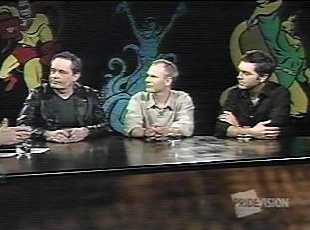
Brad raised the subject of Brian, saying that the character can be very challenging to write, and a lot of people really hate Brian. "I get e-mails from people who know I write for the show and say things like, 'Why don't you write a scene where Brian gets beat up and I come in and do it,' or things like that. Why do you think so many people react so strongly to that character?" Michael responded. "I think your point is that they react strongly to the character, because some people watch the show only because they love Brian. That's the main thing to me about the show, you can talk to five different people about who their favorite character is, and it's a different character [for each person you ask]. Some people love Brian; they love what he represents, and some people hate him." Why? "I think because he is such a self-actualized person, kind of what Dan was saying, that he doesn't apologize for being gay; he's out, he's proud, he's happy." Brad added, "He also doesn't apologize for having his own philosophy. He doesn't buy into monogamy..." Michael explained that for him, it’s about the shadow parts of the gay community, what isn’t normally seen, and how Brian gets to live them out proudly and succeed through them. "I think a lot of gay men want to believe that to do that, you have to suffer somehow, and you look at him and he doesn't suffer at all." Dan pointed out that Brian "does not believe that being queer is being straight, and he doesn't believe that being queer, you should live an imitation straight life... that idea is very affrontive to a lot of people. There's a lot of assimilation going on in the gay community." "It confounds me what people see in Brian [the negativity]," Michael stated, "because to me he's the most moral person on the show, he's very honest..." "And he's the most together," Brad added. "He's very together, he looks after his friends." "I think that's what bothers them, though, he's so unapologetic but he's also so evolved." "Absolutely." "He is the lighting rod.. he's the one that people always respond to, that they either love or hate." "Brian, he can take it too." Brad asked Dan if he could give any information on upcoming storylines in season 3? "I know we've got the rectal bleeding one, and I know we've got the one where Debbie is stabbed to death with her PFLAG pin...." Dan frowned, and banged a fist on the table in jest. "Oh, Brad, I ASKED you not to do that! Oh well, that's only the first five minutes of the first episode." "So we can't say anything else about what's in the upcoming season?" Brad teased. Dan sighed. "Justin gets pregnant, tell 'em that one." "Okay, that’s it. Justin gets pregnant." LOL!! And that’s how it ended, folks! Thanks for reading. If you have any questions, email me (Heather) at the link below.

Want more Jawbreaker? Click here for an article on Brad Fraser’s new venture, or here for a summary of Bruce Gray’s appearance (ex-George Schickel).
|
